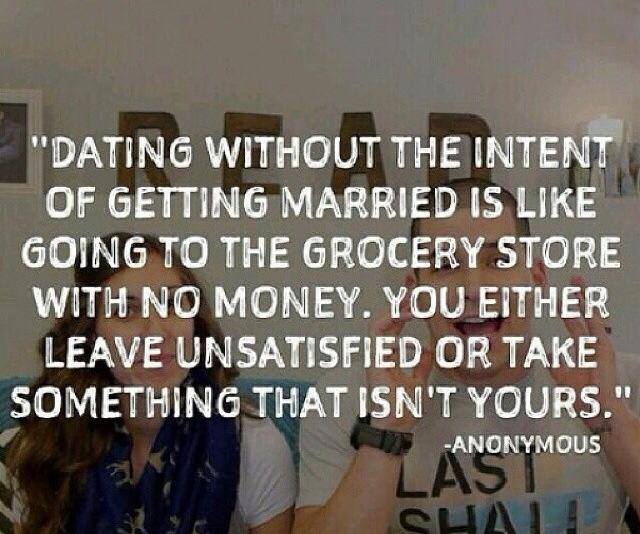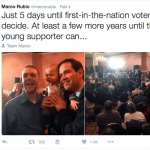I recently encountered this photo on Facebook:
Text reads: “Dating without the intent of getting married is like going to the grocery store with no money. You either leave unsatisfied or take something that isn’t yours.” — Anonymous
Whaaaaat. Let’s deconstruct this, shall we?
Why is it wrong to steal food from a grocery store? Because that food belongs to someone else—namely, the owner of the grocery store. What if the grocery store owner decides to give away produce for free, either to certain customers or on certain days? Then it’s not stealing. Who makes those decisions? The owner of the grocery store.
Let’s try to make this tortured analogy work. What is meant to stand in for the produce at the grocery store? Presumably things like making out or having sex, as well as companionship, emotional support, and memories. Note, though, that within a relationship these are things that are shared, not given or purchased. In other words, making out with a partner is not a good I am giving him, it is a shared experience we are having. Note, too, that these things are not finite, like the goods in a grocery store. Making out with a current partner does not diminish one’s capacity to make out with a future partner.
But I said I was going to try to make this analogy work, didn’t I? So let’s look at this aspect: Who owns the goods in a grocery store? The owner of the grocery store. Do you know who doesn’t own them? Someone who might come along and buy them in the future. If you steal goods from a grocery store, you are not stealing them from a future shopper, you are stealing them from the owner. Why does this matter? Because the analogy speaks of taking “something that isn’t yours.” No, the analogy isn’t talking about rape, it’s promoting the idea that a person’s “goods” (primarily their body, but also their companionship, etc.) belong to their future spouse, not to them.
In case it’s not quickly becoming clear, the grocery store analogy is falling apart all over the place. The things one shares in a relationship are not finite and exhaustible the way groceries are; if the owner of a grocery store decides to give away some of their goods, the person they give them too isn’t stealing; and the things one shares in a relationship are not goods to begin with, but rather shared experiences. As for leaving unsatisfied, that is why expectations should be clear up front—if one partner expects sex in a relationship form the very beginning, and the other only expects to have sex if the relationship is serious, there will be discord. Problems like this are best solved through communication.
But let’s look at another problem here, and that is the vilification of “dating without the intent of getting married.” I’ve personally never done this, as I was raised to take dating so seriously that asking a girl out was little different from asking her to marry you. But you know what? I don’t think it deserves to be vilified. Provided that both parties communicate and are open about expectations, I don’t see anything at all wrong with dating without the intent of getting married—and I can see some benefits.
For instance, companionship. We benefit from friendships with others, and in our day and age (with our modern ideas about love) a partner is typically a good friend with whom one cohabitates—someone you can lean on for support, and make memories and share life experiences with. We have this idea that a relationship that isn’t permanent—one that doesn’t last until death—is somehow subpar or not worth considering. I think this is unfortunate. I tell my young daughter that some friends are forever and that some are just for a time, but that friends who are just for a time aren’t any less valuable, because we learn things from them and make memories with them and leave our marks on each other’s lives. The same ought to apply to romantic relationships as well.
There are other things we gain through romantic partnerships that aren’t (or were never intended to be) longterm, too. Namely, we learn more about what we want in a potential longterm partner (or even in a future short-term partner) and we hone our relationship skills (and learn what works, and what doesn’t). I met my husband, Sean, when we were both very young, but he had had a previous girlfriend and had learned things about communication through the way that relationship fell apart. At first I was upset that he’d dated someone before me, because of the sort of analogy in the meme above—I felt his ex-girlfriend had somehow stolen something from me—but over time I came to see that she actually gave me a gift. She didn’t detract from Sean, she improved him.
This isn’t to say that there aren’t bad relationships or partners who do damage. There are. As my children grow I plan to teach them about the characteristics of a healthy relationships and warning signs of an abusive one. I want to both teach them how to interact in a healthy way with a parter and how to recognize abusive patterns a partner may engage in. In some cases, having previously had an abusive partner may help give a person the tools to recognize signs of abuse in a future partner. In other cases, a person may go from abusive relationship to abusive relationship, without the tools to discern the patterns. In either case, past abusive partners may leave scars, or hurts that have to be worked through over time. But the issue here isn’t having short-term relationships or relationships not intended to end in marriage, it’s abuse, which can occur in any relationship.
At its core, opposition to forming romantic relationships without the intent of marriage is rooted in the idea that you—your body, your companionship, your experiences—belong to you future spouse, even if you won’t meet them for a decade or more. Note who you do not belong to—yourself. This opposition is also rooted in a perception of relationships that focuses on giving and taking rather than on sharing experiences and life. Next time you hear conservatives talking about the importance of marriage, it’s worth remembering that their entire conception of relationships may differ fundamentally from yours.
















